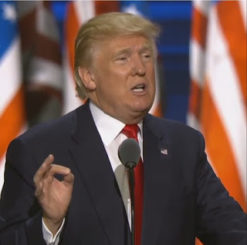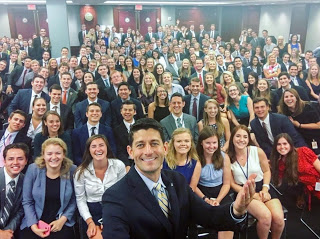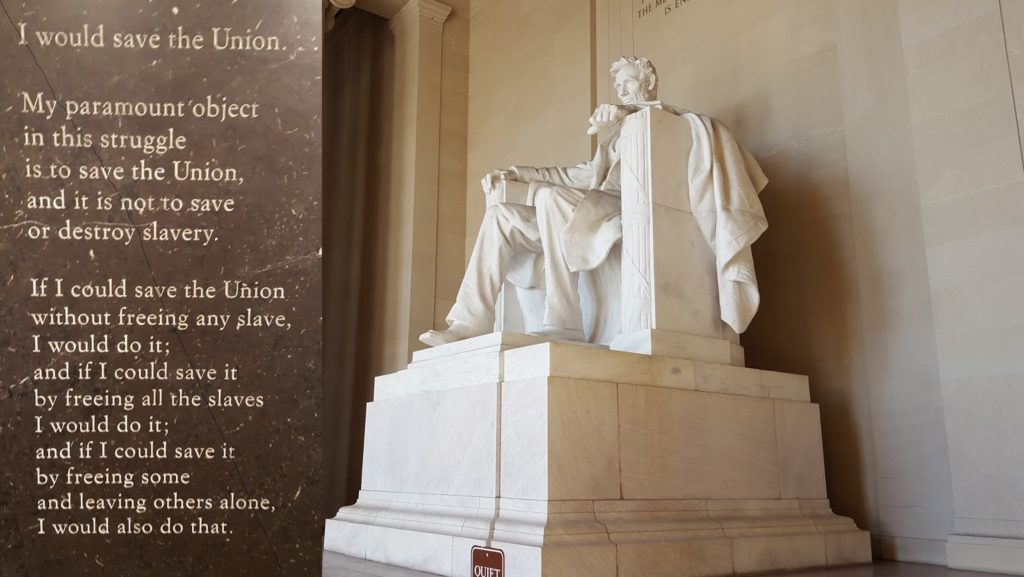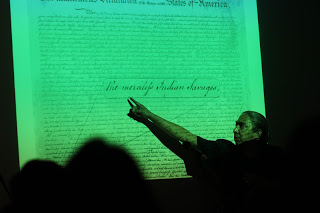
The challenge with Donald Trump is that he understands all too well what made America “great.” And this has presented a problem for the Republican Party, and now, with his nomination, will cause a problem for the entire country. America’s “greatness” is based on explicit, systemic, and dehumanizing racism.
One cannot discover lands that are already inhabited, unless they believe the previous inhabitants are less than human.
One cannot enslave an entire race of people, unless they consider them to be sub-human (like maybe 3/5ths).
One cannot say “All men are created equal” in their Declaration of Independence, and then 30 lines later refer to Natives as “savages,” unless they have a very narrow definition of who is and who is not human.
One cannot establish the legal precedent for land titles based on a Doctrine of Discovery, stating that natives only have the right of occupancy to land, while Europeans have the right of discovery and therefore the true title to the land, unless they consider indigenous peoples to be less than human.
One cannot refer in their history books to a century of ethnic cleansing and genocide of native peoples as “expansion” and “manifest destiny,” unless they consider the native peoples of this continent to be sub-human.
One cannot write Jim Crow laws, enforce segregation, establish boarding schools, and create internment camps, unless they consider the populations impacted by those systems to be less than human.
And one cannot nominate a candidate for President who promises to “Make America Great Again” when there is not a single point in their nation’s history when citizens of every race were treated as equals under the law.
Unless their definition of “great” is explicit and systemic racism.
And Donald Trump understands that. He announced his campaign for President by calling Mexicans “rapists and murderers.” And he promised to build a great big wall to keep them out. He responded to tragic terrorists attacks by proposing a national ban on an entire religion. And he threatens to torture and kill women, children, and other non-combatants from that people group in his war on terror. He openly mocks and objectifies women. He regularly demeans and marginalizes Native peoples. Donald Trump knows what made America great, and he is bound and determined to usher in a new era of explicit and systemic racism.

This has created a problem for Paul Ryan, the Republican Party, and now, the entire nation. You see, over the past several decades most Americans have grown uncomfortable with our country’s explicit racial bias. And, therefore, they have worked very hard to make our expressions of racism more passive aggressive and implicit (see Paul Ryan’s #SpeakerSelfie and Hillary Clinton’s “Off the reservation” comment). This problem came to a head last spring when Donald Trump failed to distance himself from an endorsement by David Duke of the KKK. Speaker Ryan addressed that issue in a Press Conference when he said:
“If a person wants to be the nominee of the Republican Party, there can be no evasion and no games. They must reject any group or cause that is built on bigotry. This party does not prey on people’s prejudices. We appeal to their highest ideals. This is the party of Lincoln. We believe all people are created equal in the eyes of God and our government. This is fundamental. And if someone wants to be our nominee, they must understand this.”
His open and public rebuke, however, was deflated merely minutes later when Speaker Ryan, responding to a question regarding a possible Trump nomination, affirmed that he does indeed “plan to support the [eventual] nominee.”
On the surface, his statement appears contradictory. How could someone associate their party with Abraham Lincoln (who freed the slaves), affirm the belief that “all people are created equal,” and then immediately pledge to support a nominee who has clearly and repeatedly stated that he does not hold those same values?
This is where it is helpful to have a better historical understanding of Abraham Lincoln and what he was motivated by.
In the museum located at the base of the Lincoln Memorial there is a plaque hanging on the wall that states:
“I would save the Union. My paramount object in this struggle is to save the Union, and it is not to save or destroy slavery. If I could save the Union without freeing any slave, I would do it; and if I could save it by freeing all the slaves I would do it; and if I could save it by freeing some and leaving others alone I would also do that.”
 I have stood near this plaque and watched lines of people pass by. Most simply read it and move on. Almost no one pauses or even raises an eyebrow. But when I stop them and point out that this plaque is literally stating that according to Abraham Lincoln “Black Lives Don’t Matter,” they look at me, turn around, read the plaque again, shake their heads in amazement, and then pull out their cameras to take a picture.
I have stood near this plaque and watched lines of people pass by. Most simply read it and move on. Almost no one pauses or even raises an eyebrow. But when I stop them and point out that this plaque is literally stating that according to Abraham Lincoln “Black Lives Don’t Matter,” they look at me, turn around, read the plaque again, shake their heads in amazement, and then pull out their cameras to take a picture.
I then educate them on another tidbit of history regarding our 16th president.
In December of 1862, Abraham Lincoln ordered the largest mass execution in the history of the United States. After the United States failed to meet its treaty obligations, the Dakota people raided American settlers and conflict with the US Military ensued. After more than a month, several hundred Dakota warriors surrendered themselves. They were each tried in military courts, and 303 were condemned to death. Because these were military trials, the executions had to be ordered by the President.
Three hundred and three deaths seemed too genocidal for Abraham Lincoln. So he modified the criteria of what charges warranted a death sentence. Under his new criteria, only 2 were sentenced to die. That small number seemed too lenient and would most likely lead to an uprising by the white settlers in the area. So, once again, he changed the criteria. Ultimately, 38 Dakota men were executed on December 26, 1862, by order of President Lincoln. It is important to note that he did not order retrials, even though the initial trials could easily have been seen as a sham, but instead he merely changed the criteria (twice) of what charges warranted a death sentence.
” . . . If I could save the Union [by hanging 303 Dakota warriors], I would do it; and if I could save it [by hanging 2 Dakota Warriors] I would do it; and if I could save it [by hanging 38 Dakota Warriors in the largest mass execution in the history of the United States] I would also do that . . .”
Abraham Lincoln was primarily motivated by his desire to save the union. Paul Ryan is motivated by his desire to unify the Republican Party and eventually the country. The problem both these men face[d] is that they are attempting to unify a nation that is systemically racist.
And so when Horace Greeley published an op-ed in the New York Tribune calling for immediate emancipation, Abraham Lincoln was compelled to respond in a way that assured the states and citizens who owned slaves that he did not actually believe “Black Lives Mattered.” Likewise, when Paul Ryan’s Republican Party nominates a candidate who is explicitly racist, the Speaker publicly pledges his support to that nominee. Tragically, both men believe that unity, for a nation that is rooted in racism, requires its leaders, from time to time, to publicly deny the humanity of the minorities within that nation.
But there is a better way.
George Erasmus, an aboriginal leader from Canada said, “Where common memory is lacking, where people do not share in the same past, there can be no real community. Where community is to be formed, common memory must be created.”
This quote gets to the heart of our nation’s problem with race. The United States of America does not share a common memory, and therefore, we struggle to have real community. White citizens of this country remember a mythical history of discovery, expansion, opportunity, and exceptionalism, while our communities of color have the lived experience of stolen lands, broken treaties, ethnic cleansing, slavery, Jim Crow laws, boarding schools, segregation, internment camps, and mass incarceration.

There is no common memory.
But we can change that. We can more accurately teach our history. We can acknowledge and address the Doctrine of Discovery and the racism it embedded into our foundations. We can apologize for and own our mistakes. And we can stop pandering to our citizens stuck in their narcissistic and racist world views.
We can create a common memory, and begin planting seeds for better community.
Make no mistake, the United States of America is explicitly and systemically racist. The Declaration of Independence states it. The Constitution codifies it. The Supreme Court legalizes it. Abraham Lincoln affirms it. Donald Trump campaigns on it. And Speaker Ryan endorses it.
But until we can acknowledge it, we will remain incapable of ever changing it.
The problem the Republican party, and now our entire nation, has with Donald Trump is actually a problem with the very foundations of our country. And while it definitely will not be easy, we can stop endorsing it, and begin changing it.
Mark Charles is a speaker, writer, and consultant from Fort Defiance, AZ, located on the Navajo Reservation. The son of an American woman (of Dutch heritage) and a Navajo man, Mark seeks to understand the complexities of American history regarding race, culture, and faith in order to help forge a path of healing and reconciliation for the nation. This article originally appeared on Mark’s blog, WirelessHogan.com, and appears here by kind permission of the author.


